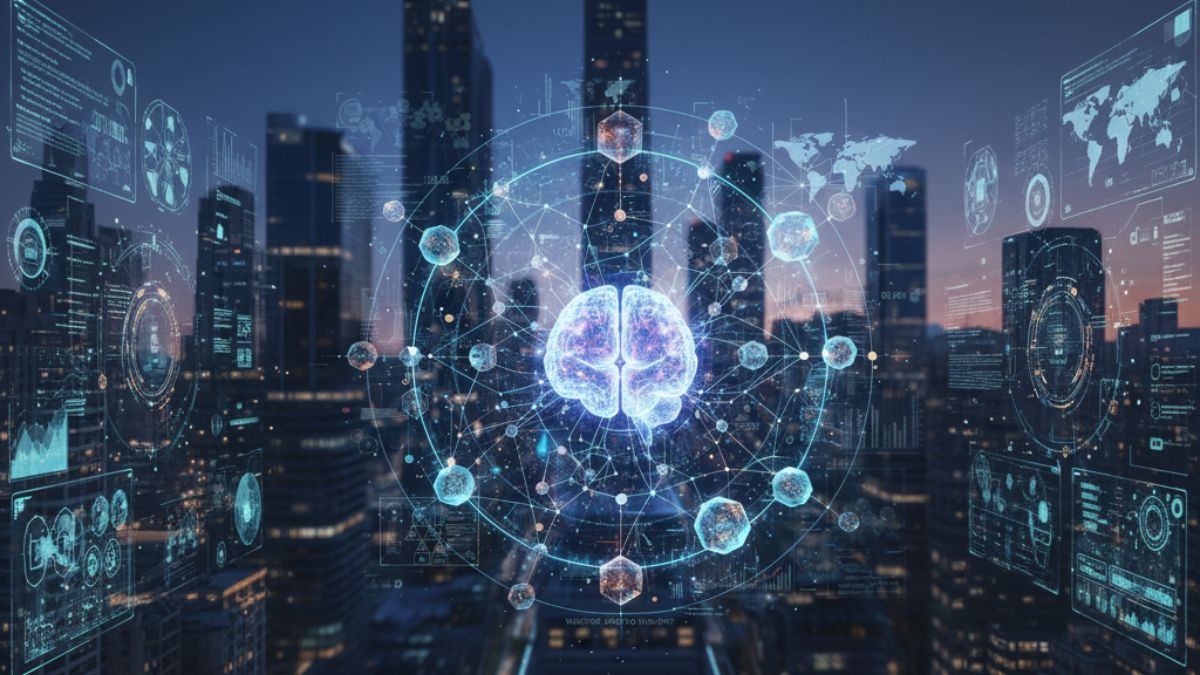Artificial Intelligence is no longer just about chatbots that answer questions. A new and exciting part of AI is AI Agents. These are smart programs that can do things for you, make decisions, and complete tasks without needing you to give every single instruction. If you are new to AI, this guide will help you understand what AI agents are, what they can do, and how you can use them in everyday life.
What Are AI Agents
An AI agent is a computer program that can perform actions to achieve a goal. Unlike regular software that needs step-by-step instructions, AI agents can think, plan, and act on their own. You can imagine them as digital helpers that not only answer questions but also do things for you.
For example, a chatbot might tell you how to book a flight, but an AI agent can actually book the flight, compare prices, and send you confirmation without your intervention. This ability to act independently is what makes AI agents special.
Now, let’s take another example for software engineers. AI agents can help with writing code, debugging, testing, and even learning new programming languages. For example, AI agents can generate boilerplate code for a project, suggest improvements, or optimize existing code automatically. They can also assist in finding and fixing bugs by analyzing error messages and providing solutions. Some AI agents can even help manage a full coding workflow, like creating functions, connecting APIs, and generating documentation, reducing the time developers spend on repetitive tasks.
What AI Agents Can Do
AI agents can do a lot of things. They are designed to help with tasks that are repetitive, complicated, or require decision-making. Some examples include:
- Automating daily tasks like scheduling meetings, sending emails, or creating reminders
- Analyzing data to find patterns, trends, or insights that help you make better decisions
- Helping with work by summarizing documents, writing reports, or preparing presentations
- Interacting with software, such as opening apps, filling forms, or managing files
- Managing workflows by performing multiple steps automatically, such as processing orders or updating databases
- Creating content, including text, images, or social media posts
In short, AI agents can combine intelligence, reasoning, and automation to do more than just respond; they can take action.
How to Use AI Agents
Using AI agents has become very easy, even if you are not a programmer. Many platforms provide ready-made agents that you can use with little setup. For personal use, AI agents are often built into apps like Microsoft Copilot, ChatGPT Actions, or Google’s AI tools. You just need to describe what you want, and the agent will start helping.
For businesses, AI agents can automate processes like customer support, data entry, or sales tasks. These agents often connect to tools such as spreadsheets, email, or CRM systems so they can perform real-world tasks automatically.
If you are new, here are a few beginner-friendly ways to use AI agents:
- ChatGPT with Actions: Lets the AI interact with apps and websites to perform tasks like sending emails or getting data.
- AutoGPT and BabyAGI: Open-source frameworks that create agents capable of planning and completing tasks on their own.
- Hugging Face Agents: Prebuilt models that can do specific actions like browsing the web or analyzing text.
You do not need to code for most of these agents. Many platforms let you set them up using simple instructions or drag-and-drop tools.
What is the difference between AI agents, AI assistants, and bots?
| AI agent | AI assistant | Bot | |
| Purpose | Autonomously and proactively perform tasks | Assisting users with tasks | Automating simple tasks or conversations |
| Capabilities | Can perform complex, multi-step actions; learns and adapts; can make decisions independently | Responds to requests or prompts; provides information and completes simple tasks; can recommend actions but the user makes decisions | Follows pre-defined rules; limited learning; basic interactions |
| Interaction | Proactive; goal-oriented | Reactive; responds to user requests | Reactive; responds to triggers or commands |
Key differences are Learning, Autonomy, and Complexity. AI agents use machine learning to adapt and improve their performance over time. They also have the highest degree of autonomy and are designed to handle complex tasks and workflows.
Popular AI Agents
Here are some popular examples:
- GitHub Copilot: Helps developers write code, complete functions, and debug efficiently.
- ChatGPT: A versatile AI agent used for writing, summarizing, coding, research, and general conversation.
- Microsoft Copilot: Integrated into Word, Excel, and Outlook, it can draft documents, create presentations, analyze data, and manage emails.
- Notion AI: Assists with organizing notes, summarizing documents, generating content, and creating task lists.
- Replika: Acts as a personal companion, helping users track goals, plan their day, or provide emotional support.
- x.ai: An AI scheduling assistant that can read emails and automatically schedule meetings.
- Tabnine: Autocompletes code and provides coding suggestions in multiple programming languages.
- AutoGPT and BabyAGI: Autonomous AI agents that can manage multi-step workflows like research, summarization, and project management.
These AI agents are making everyday tasks easier and saving time across coding, productivity, communication, and personal management.
Things to Keep in Mind
AI agents are powerful, but they are not perfect. They depend on the quality of data and the instructions they are given. Sometimes they may make mistakes or take actions you do not expect. Privacy and security are important, too, because agents often need access to personal or sensitive information.
It is a good idea to start slowly, monitor what the agent does, and gradually give it more responsibility as you trust it. Many platforms allow you to set limits and permissions to control what the agent can do.
Final Thoughts
AI agents are changing how we interact with technology. They are no longer just tools that respond to commands; they can act, plan, and help you complete tasks on their own. For beginners, learning to use AI agents can save time, boost productivity, and make complicated tasks much simpler.
As AI continues to improve, agents will become even more capable, helping us in work, learning, and everyday life. Starting to use them today is a great way to prepare for the future of smart, autonomous digital helpers.







